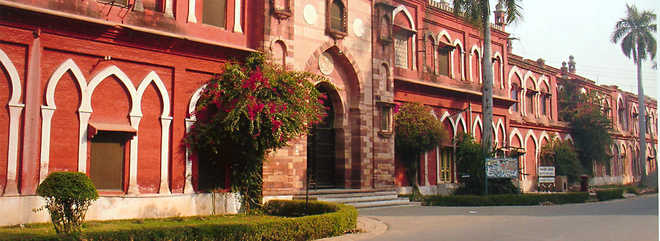Aligarh, as I know it
My association with Aligarh started in the late eighties when my sister joined Women’s College as an undergraduate student. The frequent visits to her hostel acquainted me with the AMU culture.
I could sing Majaz Lucknawi’s Ye mera chaman, ye mera chaman, the AMU anthem; knew how to respectfully address men as Bhai and women as Bibi; and learnt about the excitement around Sir Syed Day when boys and girls were allowed to mix freely.
While my schoolmates discovered homosexuality through books, I saw it at close quarters at the Abdullah Hall hostels.
Eventually, when I joined Women's College as a Geography major student, my transition from a Guwahati Cotton College-ite to AMU-ite was easy. And when I found myself, in my second year, with a lesbian roommate, with a steady partner, I didn’t wince.
Well, I was a little claustrophobic but definitely not homophobic. Claustrophobic, for the tiny room meant for two now had three of us. I often had to make hasty tactical retreats for obvious reasons.
None of the students at Abdullah Hall would react to homosexuality by staging a dharna or invoke the Islamic sentiment.
Not even when we had a temporary warden who moved into the warden’s quarters with her girlfriend, with the word ‘couple’ written all over them! This particular warden had quite a fan following in our hostel as she was young and liberal, yet strict. Under her supervision, our hostel had become the most disciplined hostel on the campus.
Nothing could have stopped me from watching Hansal Mehta’s Aligarh, a film based on the life of Dr Shrinivas Ramchandra Siras, who taught Marathi at Aligarh Muslim University. He was sacked from his position of Chairperson of Modern Indian Languages on charges of homosexuality. A sting operation was conducted by a TV channel which showed him in bed with a rickshaw-puller at his house on the campus. I needed to watch it because the Aligarh being painted by the film critics was not the one I knew. To be honest, the name of the university, ‘AU’, in Mehta’s film was also unfamiliar.
It is not known whether the letter ‘M’ had been dropped because of the ongoing debate regarding the minority status of the university, with the BJP government wanting to make it a mainstream university. Well, so much for “sab ka saath, sab ka vikas”!
But then that’s another story. I realised that Mehta had struck off the ‘M’ for the legalities involved.
The chief protagonist Professor Siras, played by Manoj Bajpai, makes one’s heart go out to him. A superb portrayal by Bajpayee and a superb narrative by Mehta. It is indeed a human story as Rajkumar Rao, who plays the part of Delhi-based journalist Deepu Sebastian, puts it. It was one of the dialogues of the PRO of the university in the witness box during the Allahabad High Court hearing that struck me the most: “Practice of homosexuality within the university campus is haram.”
Really? I wonder who got it wrong, those four AMU administrative officers who accused Prof Siras of homosexuality or director Mehta? Was the tormentor – the AMU administration –overzealous with the charges of homosexuality against Prof Siras for bringing home a rickshaw-puller to have consensual sex (which could also have been a case of prostitution), or was it Mehta who introduced the ‘haram’ tag because it goes so well with the conservative Muslim opinion?
That raises one more question -- had Prof Siras been involved with a steady partner from his own social and intellectual standing, as was our warden, would that have softened the stand of his persecutors? He was above 60 with only three months to retirement. Both would have gained in that case: Prof Siras a companion, and AMU a problem less on its list of woes.
If only Prof Siras, who was a closed person, had reached out, he would have realised that he was not the only one with a different sexual orientation on the campus. Mehta has an explanation for Prof Siras’s loneliness—a man who teaches Marathi in the Urdu-dominated campus. Mehta perhaps does not know that AMU has a strong Malayalam department with which many well-known writers are associated.
To give credit to Mehta’s argument, I would agree that it is difficult being from a different ethnicity, language or culture to survive in AMU. Here I am referring to the experience of a few North-Eastern girls, including yours truly. Language was a big barrier, and one was required to explain to the bhais in the shop, canteen and dining hall that Assam is very much in India and, yes, we do wear clothes and live in proper houses with electricity, not tree houses where we move around, a la ‘Tarzan’.
On the other hand, the hawk eyes of the wardens would always be on the North-East girls as a reputation of being ‘easy’ precedes us, not just in Aligarh but even in places like Delhi and Ahmedabad.
But, then, we come out of our cocoons with the purpose of being part of a larger picture. That was the very reason why my father packed us—two sisters—off to Aligarh. He gave us a piece of advice: “Don’t get into regional politics by joining Assamese students’ unions. Rather, be apart of the AMU culture.”
It was a wise advice which worked well for me. Now being married to a Punjabi Sikh for more than a decade and a half and living in a family where my mother-in-law cooks ‘seviyan’ for Eid and I make ‘shammi kebabs’ for Diwali, I can proudly say that Aligarh Muslim University not only taught me the geography of the world, but also the art of assimilation; rather well.










